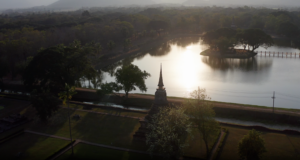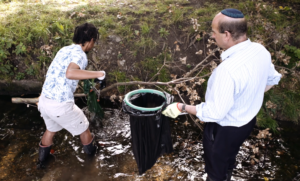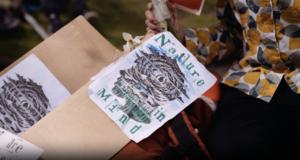In this film, we explore Sikh perspectives on climate change through the lens of religious teachings and ethics. Sikhism teaches that the Earth is sacred, a divine creation of Waheguru, and must be treated with reverence and care. The principle of ‘Sarbat da Bhala’—working for the well-being of all—extends to protecting the environment and all forms of life. The Sikh faith emphasises humility, selfless service (seva), and living in harmony with nature as core spiritual values.
Sikh commitment to sustainability is deeply rooted in practices like communal kitchens (langar), which promote plant-based diets and reduce waste, and the use of renewable energy in gurdwaras around the world. Through these teachings and practices, the Sikh tradition calls for urgent and compassionate action to address climate change, highlighting both personal responsibility and collective effort to safeguard the Earth for future generations.
By linking spiritual values with environmental activism, Climate Change: Sikhism shows how faith can inspire a more just, green, and sustainable future for all.
Transcript
Climate Change: Sikhism
Prubhjyot: My name is Prubhjyot Singh and I am a co-founder of Eco-Sikh UK. Eco-Sikh UK are here to inspire the youth of the Sikhs here in the UK to come out and look after their environment and realise that we need to change ourselves, change our lifestyles to make a change for the environment and look after our well-being and our future generations well-being. Sikhs come from an area in India called Punjab, which is in the north west bordering Pakistan. A lot of Sikhs back in the days were farmers who would grow their own food and feed their families and live sustainably. Land of Punjab is very rich in agricultural land in terms of farming. Making our own food, growing our own food and feeding our families. Traditionally, we would pass down the knowledge of good farming and living sustainably and being stewards, good stewards of the land, down generation by generation. A lot of these values have now been lost when our families have moved into the Western world. As Sikhs, we believe in Guru Granth Sahib ji and Guru Granth Sahib Ji.
Whereas most people will see it as a book where it has all of our messages written within it, we as Sikhs don't describe it as a book. Guru Granth Sahib Ji for us is a living guru which has all the knowledge contained within it. The Guru Granth Sahib Ji actually begins not with a word but with a number, and the number is one, and the number one symbolises oneness of everything. As Sikhs, we believe there is there is one God. But however, that one actually has a deeper meaning to it, which we believe it to be is there is nothing but God. So if you see that as everything is created by that oneness, we are part of that oneness. As human beings, as the animals that are out there, the environment, the trees, the water, this planet, the whole universe is part of that oneness. There's a line in Guru Granth Sahib Ji which says Pavan guru pani pita Mata tata mehat, which basically translates to that pavan. The air is our guru, the water is our father and the planet Earth. The mother is our Mata. So we need to look after the three elements.
We need to look after the Mother Earth for it to provide us with a living environment, a fresh air environment where we can go and have fresh water. We need to be able to live in balance, in sustainable balance within the creation and the environment around us. When it comes to looking after the environment, it's important for us to have a sustainable view. We need to be able to live within our means. We need to be able to look after the environment that we live in. So rather than destroying the trees or cutting them down or building on agricultural land, we need to have a balance where we're provided with the elements that we require. We require fresh air, we require water, we need all these elements to survive. And one of the biggest facts we need to remember is that Mother Earth will thrive without human beings. Whereas human beings cannot live without the natural environment and the fresh air and the oxygen that the environment provides us.
So two really important concepts in Sikhism is a seva. And sever is all about selfless giving. You might have seen Sikhs go out there and feed the poor. You might have seen Sikhs donate a lot of money to a good cause. However, we're not very good at when it comes to the environmental things. And now I think that's where sarbat da bhala is very important. So sarbat da bhala basically means. Good for all. While feeding the poor is feeding the poor. And obviously you're providing food and you're providing money for good causes. But when it comes to the environment, by planting a tree that will give oxygen to anyone that walks past that tree, and it brings that sarbat da bhala concept into a whole new vision. As eco Sikhs have been planting trees alongside Canal and River trust, we've been part of the longest orchard in the world. We've helped clean up canals, we've helped pick up litter. We've helped communities live in a better environment. Eco-Sikh is not just an organisation in UK, it's a worldwide organisation and one of our biggest teams is currently in India working on a project called Guru Nanak Dev Ji Sacred Forest. This was to celebrate Guru Nanak's 550th birthday. The concept of this project is to bring back biodiversity back into the areas where we had lost it over the last 40 to 50 years. For every tree we plant, it acts like a home or a habitat for insects, birds and animals. It's great to bring that wildlife back to the local community there. It also helps in carbon capture and bring down the pollution within those areas. So in 2019, it was Guru Nanak Dev Ji's 550th birth anniversary. This is a really important celebration for the Sikh's all around the world. While planting the 550 trees involved, we were approached by the Holy Trinity Church vicar and he wanted to celebrate Guru Nanak Dev Ji's 550th alongside the Sikh community. This was a great idea. The whole community got together, and we decided that the 550th tree would be planted in the courtyard of the Holy Trinity Church.
At this event, we had various different faiths, including the Sikhs, the Hindus, Muslims, Christians, the Jews and all the local community. This event really encompassed the message that Sikhi really brings out and Guru Nanak's message of oneness, that everything is one. The whole universe is created in that one's form. There is nothing but God. God is in all. And this event really showed that if the communities can get together and work together, we can really make a positive change in saving our environment. While a lot of the skills that we required in Punjab are not required here in the Western world, here at Ecosikh, we want to make sure that we're still keeping the values of being good stewards and sustainability, and we're passing them down to our younger generations. We can do that by reducing our plastic usage within our houses, eating local food rather than getting food from across the world, eating seasonal food, maybe reducing our water usage, maybe walking to the local supermarket. There is so much you can do at home. Start at home and then take it to the local communities. Take it to your local groups. Take it to the local gurdwaras. It's important for us all to push together and make a positive impact for the environment. Eco-Sikh hold regular talks with gurdwaras our place of worship, where we talk about how to make Gurdwaras environmentally friendly. There's many ways of doing this. This could be from looking at solar panels, using electric usage, reducing our water usage, or how we recycle our food waste from our langar, which is our community kitchen. There's so many ways of getting the community involved in helping out with all of this, but the most important part is it's not just the Sikhs, it's all the communities together. Whether you're a muslim, whether you're a Hindu, whether you're Sikh, Christian, it doesn't matter who you are. It's going to take not just one community. It will take all the communities to work together. It will take all the religions to work together. It will take the whole planet to work together. It's about everyone saving the environment for the future generations.










